Planet View: N41°00.445’ E28°58.618’
Street View: N41°00.445’ E28°58.618’
Temperature: 12°C (54°F)
A packed train ride from Selcuk to Izmir and then a quick flight on Turkish Airlines brought us back to Istanbul where we spent three nights exploring the wonders of the historic city. We had a couple of days to ourselves before meeting up with ET and Sally, who flew in from Glasgow on Tuesday night. What a great city, we could have spent more time in Istanbul, such a lively and hip place. We stayed right in the thick of the old town at Cem Sultan Hotel in-between the Blue Mosque and Aya Sofya, a couple of minutes walk from the light rail and about 15 minutes from the Grand Bazaar. More than a couple of days in one place enabled us to finally get some washing done! Definitely a bit of a temperature change further north away from the Mediterranean and Aegean, we even had a bit of rain whilst in the nation’s cultural capital.
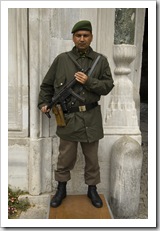 Topkapi Palace
Topkapi Palace
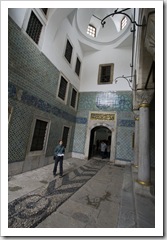
 Topkapi Palace is tucked in between the shores of the Bosphorous and the bustling tourist area of Sultanahmet in the center of Istanbul. The palace is surrounded by stone walls and beautiful gardens filled with tulips, it was built in 1453 by Mehmet the Conqueror and was inhabited by subsequent sultans until the 19th century. We spent around half a day in the palace and were glad we weren’t visiting during peak season as some of the exhibits involved 45-minute waits. Unfortunately photography was prohibited in the most extraordinary displays, but we still managed to get some good shots inside the harem and the rest of the palace grounds.
Topkapi Palace is tucked in between the shores of the Bosphorous and the bustling tourist area of Sultanahmet in the center of Istanbul. The palace is surrounded by stone walls and beautiful gardens filled with tulips, it was built in 1453 by Mehmet the Conqueror and was inhabited by subsequent sultans until the 19th century. We spent around half a day in the palace and were glad we weren’t visiting during peak season as some of the exhibits involved 45-minute waits. Unfortunately photography was prohibited in the most extraordinary displays, but we still managed to get some good shots inside the harem and the rest of the palace grounds.
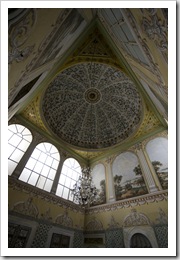
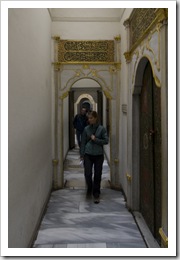
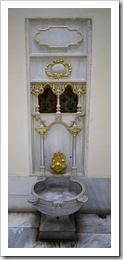 The first area we toured was the sultan’s harem, the section within the palace where all the sultan’s wives were kept (it does seem like the were kept, almost imprisoned) and tended to by a mass of eunuchs who devoted their lives to servitude. If I remember correctly, I think I overheard one tour guide mention that Sultan Ahmet had 112 children! The ornate woodwork and intricate tiling was amazing to see, it boggles the mind to think how long the artisans would have spent decorating the harem over 500 years ago.
The first area we toured was the sultan’s harem, the section within the palace where all the sultan’s wives were kept (it does seem like the were kept, almost imprisoned) and tended to by a mass of eunuchs who devoted their lives to servitude. If I remember correctly, I think I overheard one tour guide mention that Sultan Ahmet had 112 children! The ornate woodwork and intricate tiling was amazing to see, it boggles the mind to think how long the artisans would have spent decorating the harem over 500 years ago.
 The other noteworthy exhibits were the treasury, clothing display and the sacred safekeeping rooms in the palace’s third court. The treasury had the most breathtaking display of jewels I’ve ever seen, from egg-sized emeralds in the hilt of the Topkapi Dagger to the 86-carat
The other noteworthy exhibits were the treasury, clothing display and the sacred safekeeping rooms in the palace’s third court. The treasury had the most breathtaking display of jewels I’ve ever seen, from egg-sized emeralds in the hilt of the Topkapi Dagger to the 86-carat 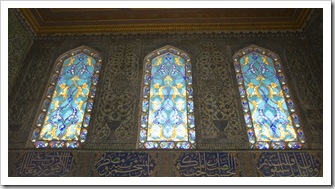 Spoonmaker’s Diamond (which is named as such because it was discovered in a rubbish dump during the reign of Mehmet IV and exchanged for three spoons!). The Spoonmaker’s Diamond is the world’s fifth largest diamond. Some of the most breathtaking items for
Spoonmaker’s Diamond (which is named as such because it was discovered in a rubbish dump during the reign of Mehmet IV and exchanged for three spoons!). The Spoonmaker’s Diamond is the world’s fifth largest diamond. Some of the most breathtaking items for 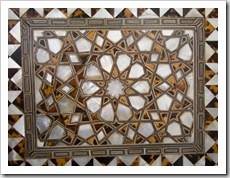 me were the diamond-encrusted stars donated to the sultans from foreign governments and monarchs, so brilliant they almost made me squint to look at them. The clothing exhibit had a display of original pieces from a range of sultans, the intricacy of the kaftans’ embroidery was amazing. My favorite was a 500+ year old fur-lined kaftan with its exterior made of white silk. The safekeeping rooms in the palace’s third court had quite a different crowd to the rest of the palace, the safekeeping rooms house an array of Muslim treasures from a number of different prophets. Muslims from all over the world undertake pilgrimages to view the religious treasures. We saw a lot of women in head-to-foot black gowns with only the tiniest of slits for their eyes, something we didn’t see anywhere else in Turkey. The safekeeping rooms have some amazing religious treasures, from actual pieces of the Prophet Muhammad’s beard and teeth to the millennia-old sword of the Prophet David.
me were the diamond-encrusted stars donated to the sultans from foreign governments and monarchs, so brilliant they almost made me squint to look at them. The clothing exhibit had a display of original pieces from a range of sultans, the intricacy of the kaftans’ embroidery was amazing. My favorite was a 500+ year old fur-lined kaftan with its exterior made of white silk. The safekeeping rooms in the palace’s third court had quite a different crowd to the rest of the palace, the safekeeping rooms house an array of Muslim treasures from a number of different prophets. Muslims from all over the world undertake pilgrimages to view the religious treasures. We saw a lot of women in head-to-foot black gowns with only the tiniest of slits for their eyes, something we didn’t see anywhere else in Turkey. The safekeeping rooms have some amazing religious treasures, from actual pieces of the Prophet Muhammad’s beard and teeth to the millennia-old sword of the Prophet David.
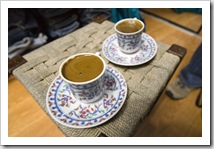
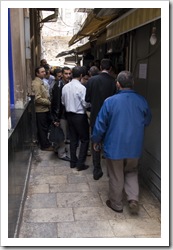
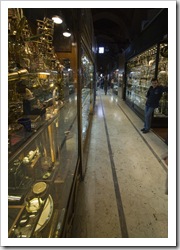 The Grand Bazaar and Spice Bazaar
The Grand Bazaar and Spice Bazaar
We visited Istanbul’s two most famous bazaars on the first afternoon we were in Istanbul and happily revisited them both when Sally and ET arrived in town a couple of days later. The Grand Bazaar is a maze of anything and everything, from jeans to chess boards, Turkish carpets to cameras, I could have probably killed a day in the expansive shopping district. We sampled our first Turkish coffee in the 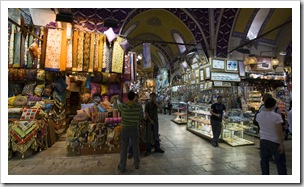 Grand Bazaar and both loved it, Lisa hadn’t drank coffee since 2001 so it was quite a leap for her. We were hooked after our first cup and had a quite a few more during our days in Istanbul. The Spice Bazaar was also a real treat, only a small portion of the size of the Grand Bazaar, as its name suggests the Spice Bazaar is almost exclusively devoted to spices and food. Most of the vendors offered some form of spices or dried fruit, while there were also a number of butchers offering mostly dried meats that would have made my dad salivate, as well as pastry shops and a few soap stands. I’m not usually a big fan of Turkish delight, but the sample I had in the Spice Bazaar had me immediately purchasing a few cubes of the treat, the tough part was choosing one of the more than 20 flavors on offer! Lots of photos here, but it such a picturesque location I just couldn’t help myself…
Grand Bazaar and both loved it, Lisa hadn’t drank coffee since 2001 so it was quite a leap for her. We were hooked after our first cup and had a quite a few more during our days in Istanbul. The Spice Bazaar was also a real treat, only a small portion of the size of the Grand Bazaar, as its name suggests the Spice Bazaar is almost exclusively devoted to spices and food. Most of the vendors offered some form of spices or dried fruit, while there were also a number of butchers offering mostly dried meats that would have made my dad salivate, as well as pastry shops and a few soap stands. I’m not usually a big fan of Turkish delight, but the sample I had in the Spice Bazaar had me immediately purchasing a few cubes of the treat, the tough part was choosing one of the more than 20 flavors on offer! Lots of photos here, but it such a picturesque location I just couldn’t help myself…
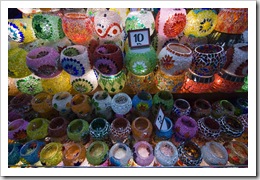
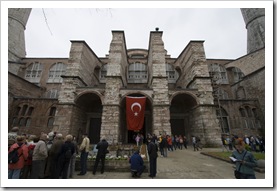 Aya Sofya and the Blue Mosque
Aya Sofya and the Blue Mosque
We visited both Aya Sofya and the Blue Mosque, arguably Istanbul’s two most famous landmarks, with ET and Sally on their first day with us in Istanbul. Both monuments are an amazing sight as they face each other across Sultanahmet Park, Aya Sofya originally a tribute to Christianity and the Blue Mosque a Muslim place of worship.
Aya Sofya was completed in 537 AD and was the greatest church in Christendom until the Conquest in 1453, when Mehmet the Conqueror converted the building to a mosque. The exterior of Aya Sofya is nowhere near as exquisite as that of the Blue Mosque, but the interior’s iconography was something to behold. The sheer size of the church was astounding, the interior has a cavernous feeling, the domed roof stretching hundreds of feet above the main hall’s floor. Quite interesting to see a building that was originally a church now with out-of-place Arabic scripts of Islam inserted into areas of prominence inside the structure. Today Aya Sofya is no longer used as a place of worship, it’s totally devoted to tourism as the adjacent Blue Mosque serves as the central place of worship in the Sultanahmet area.
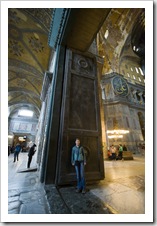
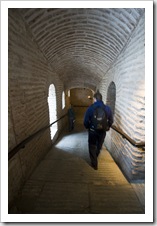
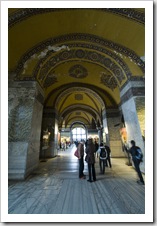
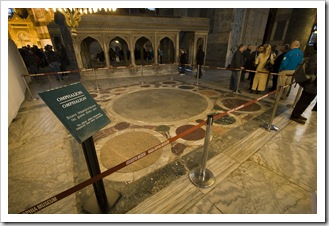 The Omphalion (pictured here to the right) is an area on the floor of the main hall of Aya Sofya that was designed to be the place at which emperors were coronated. Quite a feeling to stand there next to the stones on which countless emperors had knelt over the centuries to be coronated. So much history!
The Omphalion (pictured here to the right) is an area on the floor of the main hall of Aya Sofya that was designed to be the place at which emperors were coronated. Quite a feeling to stand there next to the stones on which countless emperors had knelt over the centuries to be coronated. So much history!
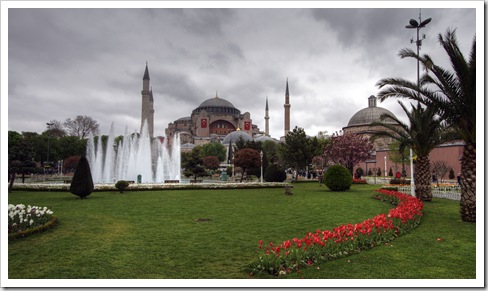 The Blue Mosque was constricted by Sultan Ahmet I in an attempt to surpass the beauty and elegance of Aya Sofya (that’s still Aya Sofya pictured to the left, but all the photos below are of the Blue Mosque). Contrary to the dedication of Aya Sofya, which was built as a place of worship for Christians, the Blue Mosque was constructed as a place of worship for the Islamic faith. On the exterior the mosque is a breathtaking structure to behold, it’s spires reach up toward the heavens with
The Blue Mosque was constricted by Sultan Ahmet I in an attempt to surpass the beauty and elegance of Aya Sofya (that’s still Aya Sofya pictured to the left, but all the photos below are of the Blue Mosque). Contrary to the dedication of Aya Sofya, which was built as a place of worship for Christians, the Blue Mosque was constructed as a place of worship for the Islamic faith. On the exterior the mosque is a breathtaking structure to behold, it’s spires reach up toward the heavens with 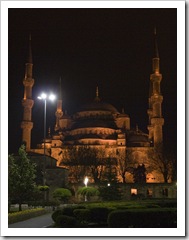 multiple domed roofs reflecting the sun. The blue tiles that give the mosque its name number in the tend of thousands, the central prayer space is enormous and is lit by hundreds of small windows. As the mosque is currently an active place of worship there are dress standards for those wishing to enter: females must wear a headscarf and both sexes must have long sleeves and pants or a skirt for women, also you can only wear socks, no shoes and no bare feet. There are also certain times of the day, namely prayer time, when the mosque is closed to visitors. While the interior of the Blue Mosque isn’t quite as intricately decorated as Aya Sofya it was still a sight to behold. It’s a little hard to make out here, but on each of the spires surrounding the mosque is an array of speakers from which the call to prayer is broadcast across Istanbul four or five times a day.
multiple domed roofs reflecting the sun. The blue tiles that give the mosque its name number in the tend of thousands, the central prayer space is enormous and is lit by hundreds of small windows. As the mosque is currently an active place of worship there are dress standards for those wishing to enter: females must wear a headscarf and both sexes must have long sleeves and pants or a skirt for women, also you can only wear socks, no shoes and no bare feet. There are also certain times of the day, namely prayer time, when the mosque is closed to visitors. While the interior of the Blue Mosque isn’t quite as intricately decorated as Aya Sofya it was still a sight to behold. It’s a little hard to make out here, but on each of the spires surrounding the mosque is an array of speakers from which the call to prayer is broadcast across Istanbul four or five times a day.
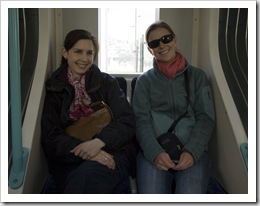 Istiklal Caddesi
Istiklal Caddesi
Before leaving San Francisco I sat down with a Turkish mate of mine, Kivanc Arda, and asked for the off-the-beaten-path locals-only areas of Istanbul we should visit to get a feel for what the city’s like away from the touristy areas. Istiklal Caddesi is the 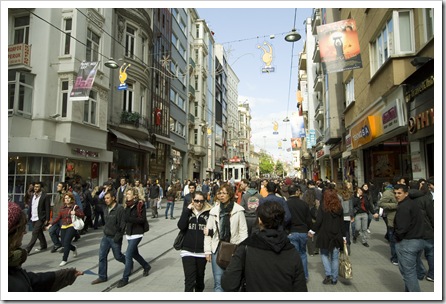 area that Kivanc said we had to visit. Istiklal Caddesi was a 30 minute train ride and then a quick jaunt in an underground funicular from our hotel Sultanahmet. The entire street, which runs for a few kilometers, is closed to traffic and is a huge open air mall. Lining the street was everything from hip Turkish clothes stores to NBA shops and the newest Diesel jeans. The first evening we ventured to Istiklal Caddesi it was raining and cold, but when we went back with Sally and ET the weather was perfect and the mall pumping with activity. One street off of the main drag near Istiklal’s center is an area called Nevizade which is a small alley crammed with seafood restaurants and bars. We were some of the very few non-Turks in the restaurants and bars during both of our visits, an excellent locale to kick back and have a few beers for the afternoon and then top it off with fantastic local food. We were fortunate to be sitting next to a table full of university students on one of our visits there, our waiter didn’t speak a lick of English and the students enjoyed helping us out with the menu translations. ET and I put back quite a few 500mL Efes lagers one afternoon in a few of Nevizade’s jaunts!
area that Kivanc said we had to visit. Istiklal Caddesi was a 30 minute train ride and then a quick jaunt in an underground funicular from our hotel Sultanahmet. The entire street, which runs for a few kilometers, is closed to traffic and is a huge open air mall. Lining the street was everything from hip Turkish clothes stores to NBA shops and the newest Diesel jeans. The first evening we ventured to Istiklal Caddesi it was raining and cold, but when we went back with Sally and ET the weather was perfect and the mall pumping with activity. One street off of the main drag near Istiklal’s center is an area called Nevizade which is a small alley crammed with seafood restaurants and bars. We were some of the very few non-Turks in the restaurants and bars during both of our visits, an excellent locale to kick back and have a few beers for the afternoon and then top it off with fantastic local food. We were fortunate to be sitting next to a table full of university students on one of our visits there, our waiter didn’t speak a lick of English and the students enjoyed helping us out with the menu translations. ET and I put back quite a few 500mL Efes lagers one afternoon in a few of Nevizade’s jaunts!
We say goodbye to Turkey after our time in Istanbul, off to Thessaloniki and then to Meteora before heading to Santorini for a wedding next weekend. We both loved Turkey, such a great time, the people were fantastic, food exquisite and a fabulous place to spend a few weeks exploring another culture. I could have spent a few more days in the sun in Fethiye and would love to go back and explore some more of the Lycian Way one day. Looking forward to Greece!
This entry was posted on Sunday, April 26th, 2009 at 7:30 AM and is filed under Turkey. You can follow any responses to this entry through the RSS 2.0 feed. Both comments and pings are currently closed.
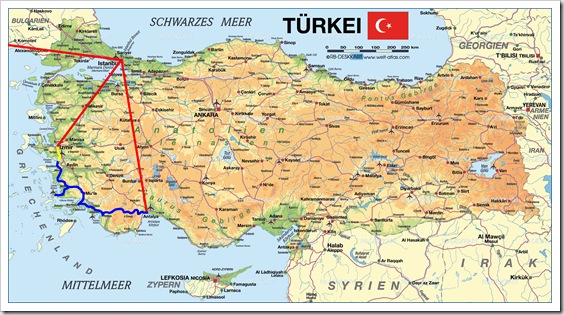
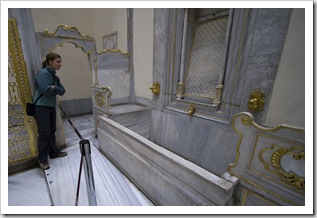
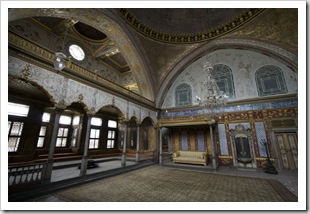
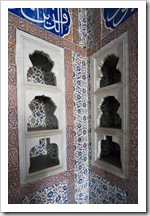
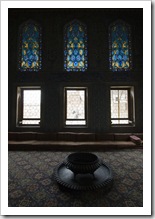
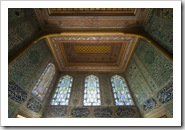
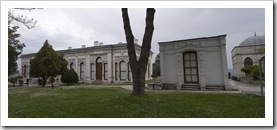
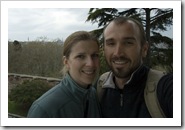
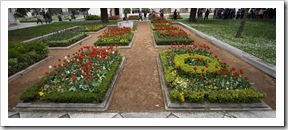
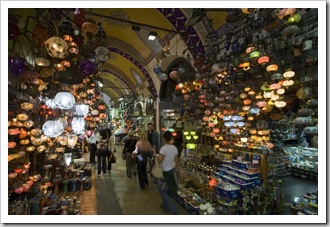
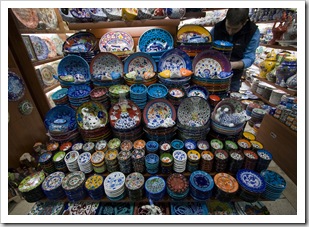
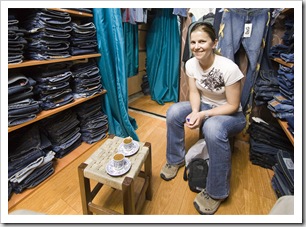
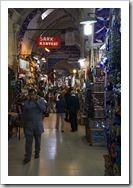
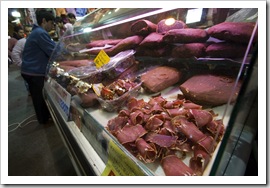
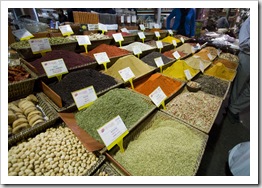
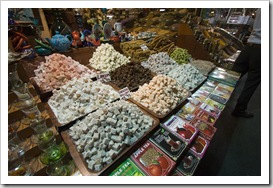
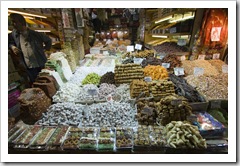
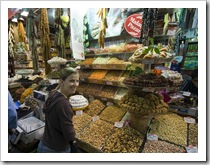
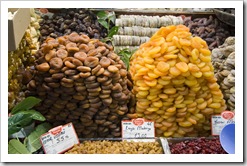
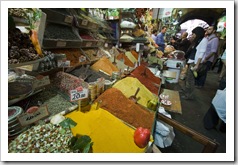
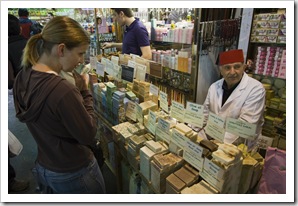
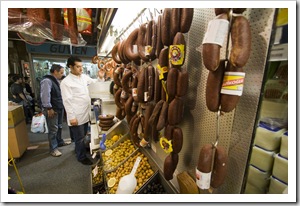
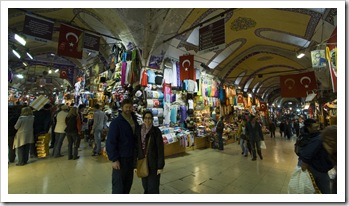
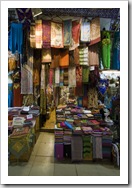
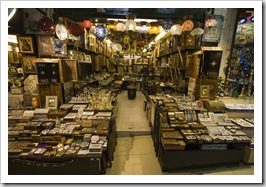
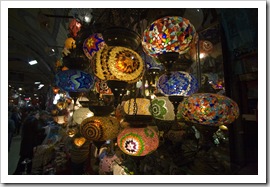
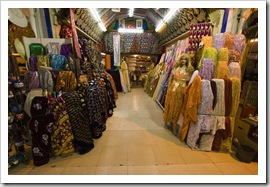
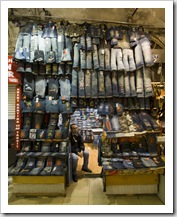
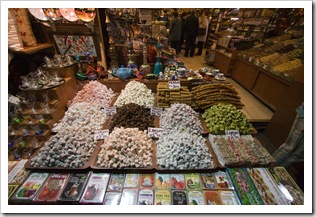
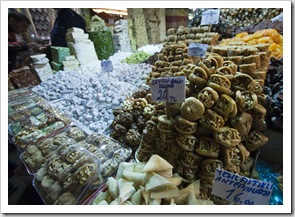
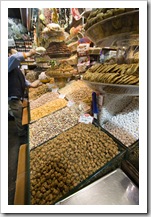
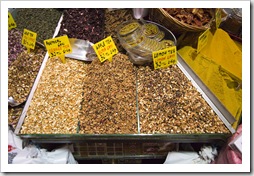
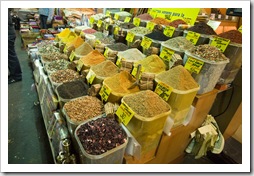
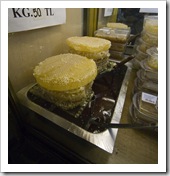

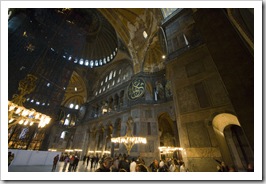
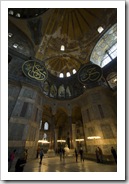
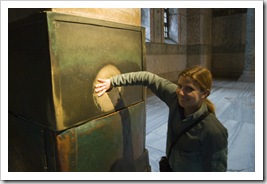
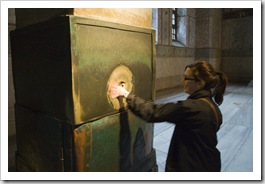
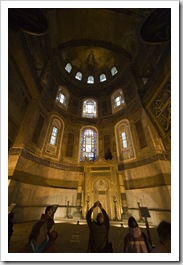
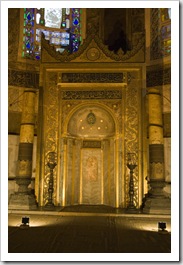
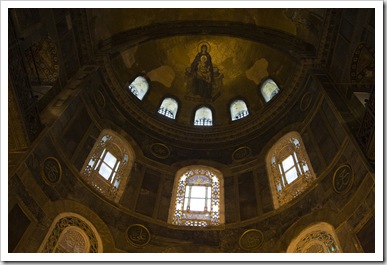
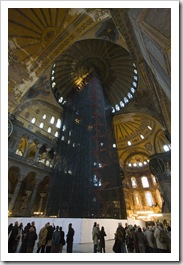
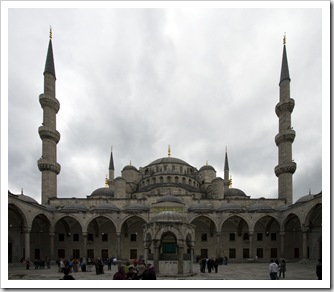

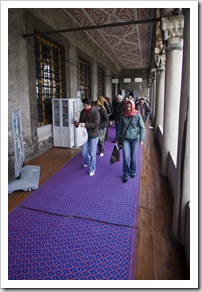
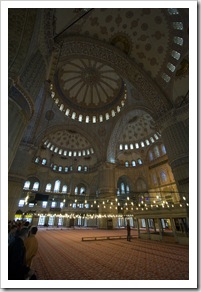
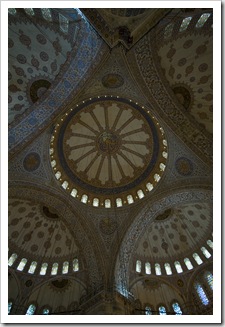

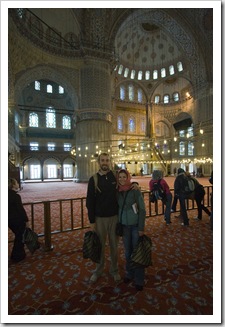
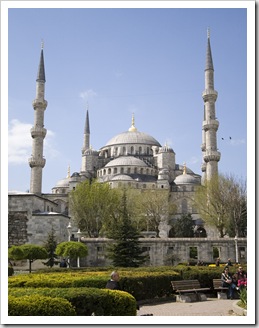
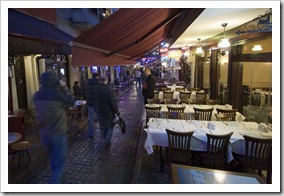
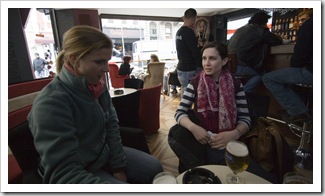
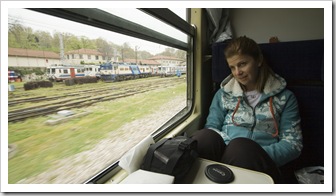

Wow!! I love Turkey…dried apricots galore!! I would eat all those apricots and then need a toliet the size of the one Lisa was sitting in at the ruins!!
Looks like you all are enjoying many fun adventures….and thinking of us all here in the states too! Thanks! 🙂
May 2nd, 2009 at 5:37 PM
You guys are so lucky! We miss you!!!!
May 4th, 2009 at 7:42 PM
So much beauty carrying so much history! Sofya I am thinking may mean Sophia in English … which in the bible is Wisdom, a name used to convey another aspect of God. And what a bazaar!
Love and hugs!
May 6th, 2009 at 2:25 AM
[…] Minh by foot, visiting a few of the local markets, which reminded us both a lot of the bazaars in Istanbul, as well as the Reunification Palace, the home of the President during times when North and South […]
September 10th, 2009 at 6:50 PM